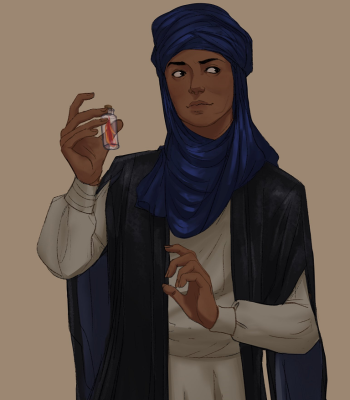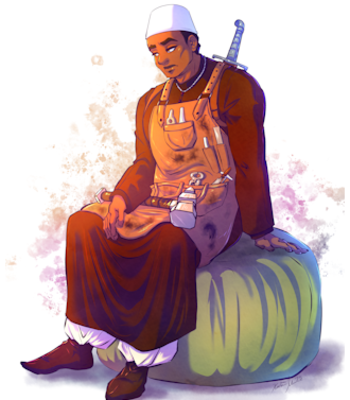All of a sudden it turns out that it's spring already, which means that it's time for the Azadi religious holiday of Solitary!
Since this is not well documented and I also lost track of time, this probably comes as a complete surprise to everybody. Please don't panic! (Or murder the mistsparrow.) While Solitary is a very important time for Azadi, I realize nobody has had the chance to think about it or what it means for their own character, and in any case both you all as players and your characters are in somewhat unique circumstances at the moment. Nevertheless, Solitary is definitely something your characters should at least know about, even if they may have lost track of exactly what the date is right now and proper observation is a bit challenging.
So....
What is Solitary?
Solitary takes place in the week and a half following the spring solstice, Rashani 21st. It is the chief religious observance of the Azadi faith, and commemorates the Prophet al-Azad's time locked away in solitude in the Black Cloud prison of Bargha. It was during this time that he received the Surah of Oneness, the first of the verses of the Perfected Song of God, as well as additional verses that came to him through the many dark days of his imprisonment. Solitary begins at sunset on the solstice.
The first day of Solitary following the solstice (Rashani 22nd) is the Day of Reckoning, during which people will settle their affairs to prepare for the days ahead. Although in practicality this preparation is performed in anticipation of a withdrawal from worldly affairs lasting only a little over a week, it is treated in the solemn manner of someone preparing for their death. The second day (Rashani 23rd) is the Day of Farewell, when each person visits family and friends to ceremonially bid them farewell. At sunset on this day, Solitary proper begins, which lasts through the end of the month (Rashani 31st).
On each day of Solitary, at least half of the day must be spent in isolation and quiet meditation. In the earlier years of the faith the entire day, from the first light of dawn until sunset, would be spent this way, but in more recent centuries the observance has become somewhat more relaxed. Religious purists dislike this, and will observe the entire period in isolation in the old way. But most people adhere to the more relaxed standard, and there is no stigma attached to this.
The practice of mindful solitude allows one to reflect upon the life of the Prophet, upon the teachings of the Perfected Song of God as revealed through the Prophet, and also upon the Song itself and one's own part in it. The holiday as a whole inspires mindful compassion for those who are isolated and alone in the world or wronged by others, including orphans, invalids, refugees, and those who dwell at the margins of society. Compassion towards prisoners as well as slaves is also a key component of the holiday. Most of the large cities of the caliphate will have a ceremonial pardoning and release of selected prisoners that takes place early in the morning of Pavana 1st, and some slave owners (including the caliph and the provincial governers) will also manumit slaves of their choice on that day.
Pavana 1st is the first day of the new year, and both the completion of Solitary and the start of the year are celebrated with the Feast of Reunion. This occasion is marked not only by feasting, but with a special service at the communal mosque, much song and music, and the exchange of gifts.
Nirzali worshipers of the caliphate also observe Solitary. For them, Solitary is an occasion of mindful solidarity with the goddess who remains outcast, yet from afar still serves as a guide and beacon for mortals. Many of them do honor al-Azad as well, seeing him as an incarnation of Nirzali's friend and lover Nthanda. Among the Nirzalites who also participate in Solitary, it is believed that the wetter and stormier the weather is during this time, the more favor Nirzali is showing to her people.
Observing Solitary
These are the basic strictures for properly observing the holy days of Solitary:
- At least half the day should be spent in solitude and meditation. Where true solitude is impossible, people should simply turn away from others and retreat into their own thoughts and prayers. Stricter interpretations assign the entire day between sunrise and sunset to silence and meditation.
- Where possible, between the hours of sunrise and sunset people should communicate only in lowered voices. Stricter interpretations allow communication during these hours only by sign or gesture.
- Neither voice nor fist is to be raised in anger during this time.
- Violence towards others is strictly prohibited. There is some dispute as to whether this is meant only to apply to other Azadi, or to all peoples of the caliphate, or if it in fact encompasses all peoples regardless of religion or community.
- No animals may be killed during this time, whether for food or any other purpose.
- The only foods allowed from sunrise to sunset are gaolbread and water, or other similarly impoverished meals.
- There must be no singing or playing of musical instruments. At the hours of prayer the faithful may engage in al-ansijam, but this is all that is allowed.
- Regarding conduct of daily business, only essential services for the aid of others may be conducted during this time, such as preparing food or medical remedies, healing the sick and injured, and caring for prisoners, orphans, invalids, and other vulnerable people.
- Any profit that might be incurred during this time (such as by selling gaolbread) must be given away as charity.
- Those who are already isolated may also observe Solitary to the best of their ability, but they are under lesser obligations, as are children under the age of 8. Travelers are also allowed some leeway in cases where their journey cannot be interrupted for the whole period.
What does this mean for me, the player??
As players, you all are welcome to decide how your characters want to observe Solitary! Each character can be as strict or lax as you think they realistically would be. They can observe each stricture with painstaking purity, go for the standard relaxed route, or be a little bit careless -- or pretend to be more pious than they are while cutting corners on the sly. However, this is the most significant holiday of the whole year for Azadi, so most ordinary people would take its observance seriously and feel fairly strongly about doing so.
I did try to make it so that "proper" observation of the holiday isn't too onerous or disruptive of people's roleplay enjoyment. You all are welcome to play that your character's solitary meditative hours take place during the time you're not in game, and that is totally fine. I did want to create enough impact that this time feels a little different to players, but not so much that it interferes significantly with what and how people want to roleplay.
That said, since this is still alpha, and the first in-game Solitary ever observed, I am open to any suggestions people might have for making it more enjoyable, or adding personal customs to the mix, or any other constructive comments you all may have!




